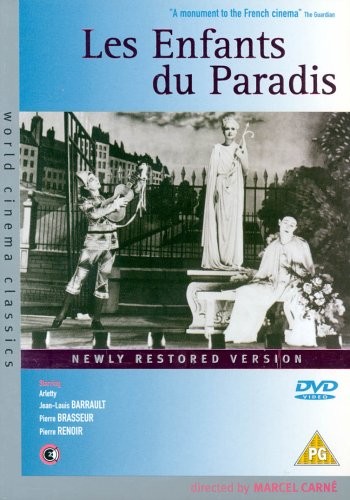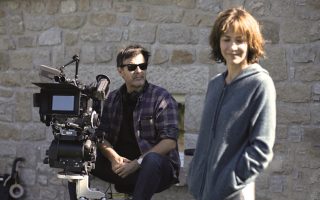Top 5 Films Written by Jacques Prévert

Much-loved French poet Jacques Prévert (1900–1977) was also a lyricist whose songs with composer Joseph Kosma were sung by Juliette Gréco and Yves Montand (Autumn Leaves). He was also a prolific screenwriter who turned out screenplays for directors Jean Renoir and Marcel Carné, among others. The Paris Cinémathèque’s big exhibition dedicated to the iconic Carné-Prévert classic Les Enfants du Paradis (Oct 24–Jan 27, 2013) is a great occasion to take a new look at Prévert’s legacy to French cinema.
MOST POLITICAL
Le Crime de Monsieur Lange (The Crime of Monsieur Lange) Jean Renoir, 1936
When Batala (Jules Berry), the crooked owner of a failing publishing firm, is believed to have died in a train wreck, his employees set up as a cooperative to go on working. The cooperative is very successful, and writer Amédée Lange (René Lefèvre)—enamored by tales of the American West—has a bestseller with his book Arizona Jim. But when Batala returns and tries to regain control, Lange is forced to take extreme measures. Released a few months after the Popular Front’s electoral victory, the movie doesn’t hide its sympathy for leftist and liberal political views. But it succeeds in being more than simpleminded propaganda, thanks to Prévert’s complex and charming characters. It’s also the first collaboration between Prévert, who was just starting out as a screenwriter, and the great French director Jean Renoir.
DARKEST
Le Quai des Brumes (Port of Shadows) Marcel Carné, 1938
An immensely popular movie, Le Quai des Brumes is the third team effort by Prévert and Carné. A military deserter, Jean (Jean Gabin) arrives in smoky Le Havre looking for a ship to leave the country. There he finds a passport, a small dog and Nelly (Michèle Morgan), a 17-year-old who has already lived far beyond her years. The two lost souls dream of a new life, but first they have to get rid of Nelly’s guardian (Michel Simon), whom she suspects of murder. Much darker than most movies made at that time, the doomed romance becomes a powerful tragedy enlightened by Prévert’s splendid dialogue, including Jean’s understated remark to Nelly, “T’as d’beaux yeux, tu sais.” (You’ve got nice eyes, you know). Morgan did indeed—even on black-and-white film—and in France the line remains as well-known and oft-quoted as Rhett Butler’s “Frankly, my dear, I don’t give a damn” in the US.
MOST INSIGHTFUL
Le Jour Se Lève (Daybreak) Marcel Carné, 1939
Although it’s not the best known of Prévert and Carné’s movies, Le Jour Se Lève still stands as one of their best works in the poetic-realism style of pre-WWII French cinema. François (Jean Gabin), a sympathetic factory worker, has just murdered a man named Valentin (Jules Berry). He locks himself up in his rooming-house top-floor walkup and, under siege by the police, begins to recall the events that led to the killing: his meetings with Françoise (Jacqueline Laurent), a young florist who was entangled with the Machiavellian Valentin, and the provocative Clara (Arletty), who was Valentin’s assistant in a vaudeville act. Both romantic and pessimistic, the film shines because of Gabin’s performance as the desperate proletarian antihero, Prévert’s tight script and Carné’s expressionistic cinematography, as creative here as ever.
MOST CHERISHED
Les Enfants du Paradis (Children of Paradise) Marcel Carné, 1945
One of the best French films ever made, the tragic tale centers around the ill-fated love between theater mime Baptiste (Jean-Louis Barrault) and the shady actress Garance (Arletty), who has three other men in her life. Fate leads both Baptiste and Garance into loveless relationships; after years of separation, they try to get together, but they are unable to escape their dramatic destinies. Made under the Occupation during World War II, Les Enfants du Paradis delivers unique and breathtaking cinematic poetry, mixing genuine feelings (the famous Arletty line, “Love is simple”) with outstanding music and cinematography. Nominated for an Academy Award, this masterpiece put life on the screen like no other film before, and very few after.
MOST JOYOUS
Le Roi et l’Oiseau (The King and the Mockingbird) Paul Grimault, 1980
Released a few years after Prévert’s death in 1977, this rare animated movie was first conceived in the late 1940s, but Prévert and director Paul Grimault were so dissatisfied with the initial early-1950s version that they kept working on it for almost 30 years. The final result is a mesmerizing blend of poetry and sheer joy, with all the delicacy and grace of traditional animation. Inspired by a Hans Christian Andersen fairy tale, the story tells of a young shepherdess and a chimneysweep who escape from paintings that come alive. They are pursued by the cruel, cross-eyed King Charles V + III = VIII + VIII = XVI, and aided by a whimsical bird and the power of art. Now finally available on the Internet with English subtitles, this poignant film is a must-see for adults and kids alike.
TIED FOR SIXTH
Drôle de Drame (Bizarre, Bizarre) Marcel Carné, 1937. Comedy
Les Disparus de Saint-Agil (Boys’ School) Christian-Jaque, 1938. Mystery
Remorques (Stormy Waters) Jean Grémillon, 1941. Drama/romance
Les Visiteurs du Soir (The Devil’s Envoys) Marcel Carné, 1942. Fantasy
Les Portes de la Nuit (Gates of the Night) Marcel Carné, 1946. Mystery
Trailers of most of these films are on www.youtube.com
Find French films in our France Today bookstore. Other possible sources: www.amazon.ca, www.amazon.fr, www.facetsdvd.com, www.fnac.com. When you order DVDs from France, you’ll need a multiformat DVD player that can read Zone 2 DVDs.
Originally published in the October 2012 issue of France Today
Share to: Facebook Twitter LinkedIn Email
Leave a reply
Your email address will not be published. Required fields are marked *



